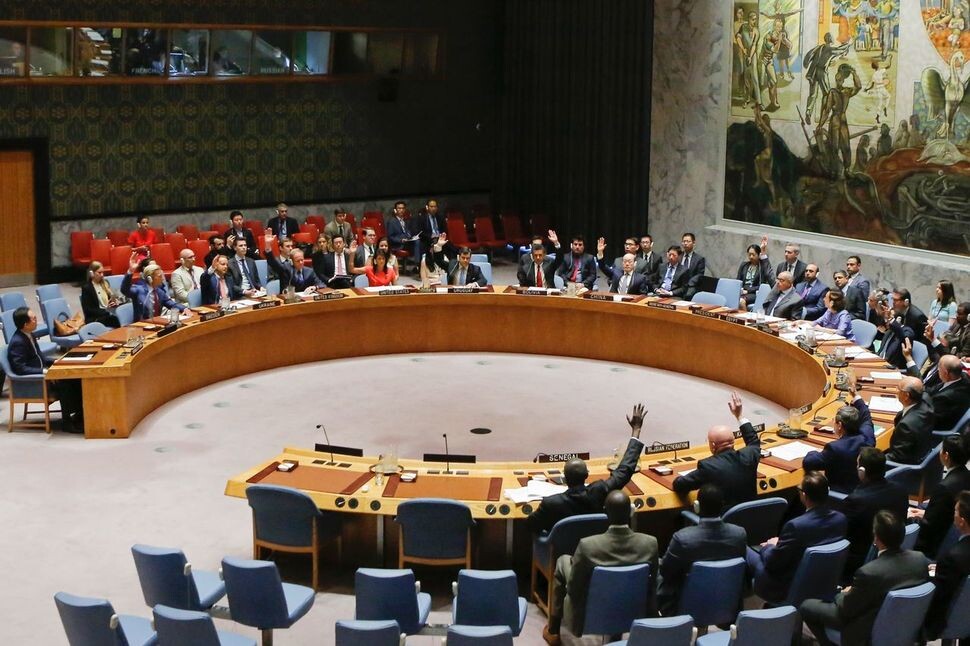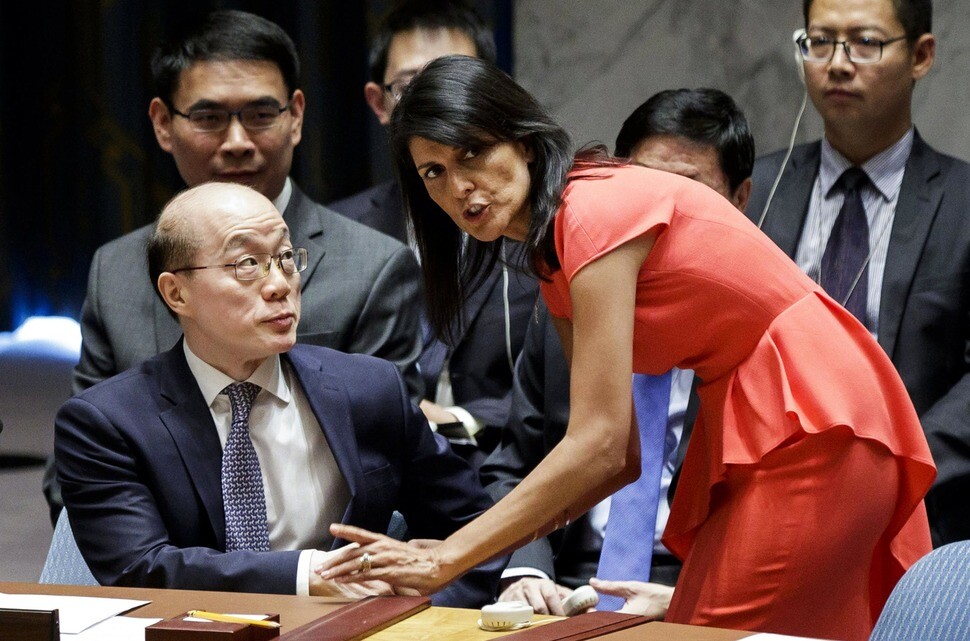hankyoreh
Links to other country sites 다른 나라 사이트 링크
[News analysis] UN sanctions make it tougher to restore inter-Korean relations

The UN Security Council’s adoption of a sanctions resolution against North Korea on Aug. 5 is likely to bring a further chill to the Korean Peninsula. For the time being, at least, the situation has come to a state where swiftly restoring inter-Korean relations is inconceivable. While Liberation Day on Aug. 15 is usually a time when a major vision and proposals are announced for inter-Korean relations, this year it’s hard to decide what message ought to be conveyed.
The South Korean government maintains that the proposals it made last month for inter-Korean military talks and Red Cross talks to arrange reunions for divided families are still valid, even though the original deadlines have passed. This means that the meetings could still be held if North Korea agrees, even this late. But the UN Security Council‘s adoption of a sanctions resolution against North Korea following the North’s launch of the Hwasung-14 intercontinental ballistic missile is leading many to conclude that Seoul should stop clinging to these talks. “For now, it has become impossible to gauge inter-Korean relations. It’s not even clear what message we should send North Korea this Liberation Day, on Aug. 15,” one senior government official said.
The Blue House has apparently taken note of the fact that the Security Council reached a unanimous agreement on the sanctions resolution against North Korea in a short period of time. In fact, the sanctions resolution was adopted just 33 days after the first test launch of the Hwasong-14 on July 4 -- much faster than the resolution adopted 57 days after North Korea’s fourth nuclear test in Jan. 2016 and the one adopted 82 days after the North’s fifth nuclear test in Sep. 2016. The Blue House seems hopeful that quickly maximizing the efficacy of the sanctions against North Korea might be able to bring the North to the negotiating table. But the Blue House is also concerned that inter-Korean relations will inevitably remain strained for some time.
The UN’s sanctions resolution against the North contains a clause banning the establishment of new joint ventures with the North and investment in existing joint ventures, and Seoul is paying close attention to how this may affect inter-Korean economic cooperation and exchange in the future. In particular, Seoul is reportedly reviewing the legal ramifications for reopening the Kaesong Industrial Complex or resuming tourism to Mt. Keumgang, both of which are likely to be considered early on in the process of restoring inter-Korean relations.

There has been a debate about the Kaesong Complex since the sanctions resolution against North Korea after the North‘s third nuclear test in 2013 contained a section banning the import into North Korea of “bulk cash,” which can be used to develop nuclear weapons and missiles. Some experts argue that the complex should be treated as an exception, given the special relationship between North and South Korea. This special relationship is a legal status that has been acknowledged by South Korea’s Constitutional Court and Supreme Court, and it‘s not subject to international law, these experts say. But others argue that the complex cannot be made an exception. Since both North and South Korea are UN member countries, inter-Korean relations are also subject to international law, the argument goes.
But the UN Security Council’s sanctions resolution does not take issue with the Kaesong Complex itself. Instead, individual transactions that take place inside the complex, such as new investment in a specific firm, could be subject to the sanctions. The UN Security Council delegates the authority to designate exactly what is subject to the sanctions to the sanctions committee. The sanctions committee also has the authority to grant an exception to the sanctions for humanitarian projects that receive prior clearance.
The South Korean government has not taken a definite official stance on this debate. “Setting aside legal questions, discussing the reopening of the Kaesong Industrial Complex or the resumption of tourism to Mt. Keumgang is not feasible until we’re on track to resolve the North Korean nuclear issue. Once we get there, we’ll move into a new phase that would include the relaxation of sanctions on North Korea,” said a government official.
By Park Byong-su, senior staff writer, and Jung Yu-gyung, staff reporter
Please direct questions or comments to [english@hani.co.kr]

Editorial・opinion
![[Column] The state is back — but is it in business? [Column] The state is back — but is it in business?](https://flexible.img.hani.co.kr/flexible/normal/500/300/imgdb/original/2024/0506/8217149564092725.jpg) [Column] The state is back — but is it in business?
[Column] The state is back — but is it in business?![[Column] Life on our Trisolaris [Column] Life on our Trisolaris](https://flexible.img.hani.co.kr/flexible/normal/500/300/imgdb/original/2024/0505/4817148682278544.jpg) [Column] Life on our Trisolaris
[Column] Life on our Trisolaris- [Editorial] Penalties for airing allegations against Korea’s first lady endanger free press
- [Editorial] Yoon must halt procurement of SM-3 interceptor missiles
- [Guest essay] Maybe Korea’s rapid population decline is an opportunity, not a crisis
- [Column] Can Yoon steer diplomacy with Russia, China back on track?
- [Column] Season 2 of special prosecutor probe may be coming to Korea soon
- [Column] Park Geun-hye déjà vu in Yoon Suk-yeol
- [Editorial] New weight of N. Korea’s nuclear threats makes dialogue all the more urgent
- [Guest essay] The real reason Korea’s new right wants to dub Rhee a founding father
Most viewed articles
- 1Amid US-China clash, Korea must remember its failures in the 19th century, advises scholar
- 2[Column] The state is back — but is it in business?
- 360% of young Koreans see no need to have kids after marriage
- 4New sex-ed guidelines forbid teaching about homosexuality
- 5Trump’s talk of flouting NATO promises sparks apprehension in Seoul
- 6[Column] Why Korea’s hard right is fated to lose
- 7[Guest essay] Maybe Korea’s rapid population decline is an opportunity, not a crisis
- 8[Reporter’s notebook] In Min’s world, she’s the artist — and NewJeans is her art
- 9Presidential office warns of veto in response to opposition passing special counsel probe act
- 10[Column] Life on our Trisolaris